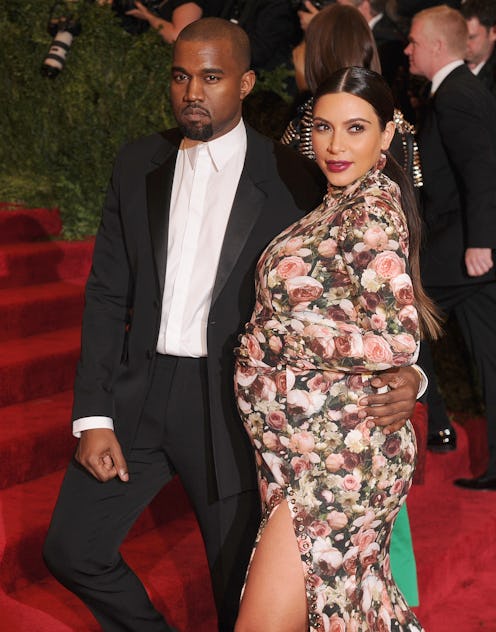Only four days after the birth of baby Kimye, it's been revealed that Kim Kardashian and Kanye West will grace the cover of Friday's People telling the "harrowing" story of the baby's birth. And although it sickens me to say it, I'm 100 percent sure the issue will fly off the shelves. Baby Kimye has been the Internet's biggest trending topic since her birth on Saturday, and, clearly, Kardashian and West are going to ride the wave of public interest until the story isn't of interest anymore. (And how old will baby Kimye be before we stop checking on her? 32? Older?) Add to that the fact that Kate Middleton is quickly approaching her due date and we have an international baby craze of epic proportions on our hands. There are articles about who Middleton's gynocologist is and what her schedule looks like leading up to the birth, which is pretty insane considering that doesn't even qualify as baby news.
But why on earth are we so obsessed with celebabies? After all, they're just like all other babies — they look like my great-grandmother and are not exactly rare. Still, we pay so much attention to them, you'd think they were unicorns that pee rainbows. But if we probe a little deeper, our celebaby fixations tie in neatly with our psychological need to both care about babies and to indulge in celebrity worship. Celebabies are the weird half-step between psychotic celebrity fixation and evolutionary tendency, making them almost irresistible for those of us who regularly peruse gossip sites and newspapers.
As much as this might sound like a joke, Celebrity Worship Syndrome is a legitimate psychological ailment, and it functions on three levels: Entertainment-Social, Intense-Personal, and Borderline-Pathological. The entertainment-social dimension encompasses a normal interest in celebrities — it means you like to discuss stars with your friends. Intense-personal engagement takes on a more dedicated mental space, making you feel a "special bond" with a celebrity, even taking on their hardships as your own. Borderline-pathological weaves in with fantasies and often underlying psychological problems, leading to uncontrollable thoughts about a celebrity. For obvious reasons, this can grow to be a serious problem for those in its grip.
From there, we can factor in our evolutionary need to feel connected and protective of babies, even if they aren't our own. It's the reason girls get broody right before their period (oh hell, I'll admit it, all the damn time, period or no) and why our body releases a veritable cocktail of hormones post-birth to make us love the bald blood-and-goo covered screaming thing that just caused us roughly nine months of discomfort. Our bodies prime us to protect babies and children, because if they didn't, humans would've gone extinct a long time ago. We'd probably also be a little nonplussed because animal babies are heart-meltingly cute and human babies look like tiny old people who shit themselves constantly.
With these two factors in mind, understanding our weird need to know about celebrity offspring starts to make more sense. As a celebrity-driven culture, we're curious to see what the little Prince or Princess will look like, just as we're curious to see how Baby Kimye will weather her first awards show or the famed Twerkin' Twos. However, we also feel an immediate bond to children, one that might fall under the Intense-Personal dimension of Celebrity Worship Syndrome if they were adults. But given how darn cute we know the babies are going to be, the bond ends up falling into a grey area somewhere beyond Entertainment-Social but not quite Intense-Personal.
It might also be similar to how we feel about a niece or nephew we don't see very often — we don't have a personal stake in their development, but it's fulfilling to watch them grow and become their own person, someone we can be proud of. Celebrities, to the public eye, emerge Athena-like from nowhere. We know there had to be personal growth and sacrifice to become so successful, but we never get to see it in its formative stages. That's where celebabies come in. We get to watch fame affect them every step of the way, see their teenage pratfalls and ugly duckling moments, all of which generally serves to endear them to us. It makes us feel like we know them more than we know their parents, even though they are complete strangers.
Celebabies somehow provide the "bond" to celebrities that people want to have, so our fascination is understandable in the context of how the human mind works. Which is good, because the media is all up in these babies' grills, and clearly that's not going to change. Good luck Baby Kimye and Baby Prince/Princess — you have long lives and many flashing camera bulbs ahead of you.
